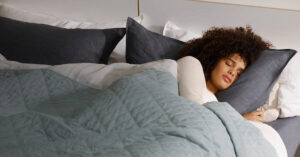Eating Before Bed: Is It Bad For You?
Disclosure: By clicking on the product links in this article, Mattress Nerd may receive a commission fee at no cost to you, the reader. Read full disclosure statement.
Many of us have squeezed in that last minute snack right before bed. Sometimes a craving hits and you just have to satisfy it. For some, this has no effect on their sleep. But for others, it can significantly impact their ability to get a restful night of sleep.
There is really no one-size-fits-all answer about the potential drawbacks of eating at night. It all depends on the individual, their lifestyle and what it is you eat right before bed. There are some things to consider when it comes to eating right before bed.
Acid Reflux
About 40% of the population is prone to heartburn, or acid reflux as it is more scientifically known. Acid reflux feels like a burning sensation in your esophagus or throat, which can be triggered by strong foods like spicy dishes or heavy meals.
This is a condition that should consider before you eat prior to bed. Acid reflux can get worse if you eat a big meal close to bedtime because when you lie down, your stomach acid can be pushed back up into your esophagus and throat. This is more likely to happen in those with frequent heartburn, but everyone is at risk for this to happen.
Additionally, the type of food you eat can aggravate the symptoms of acid reflux. This may mean cutting back on acidic and spicy foods, especially late at night. If you find yourself experiencing these symptoms more than twice a week, and are leaving adequate time between your last meal and when you lay down, you should seek out a doctor’s help.
The general recommendation if you have acid reflux is to eat at least three hours before you go to bed.
Snacking Before Bedtime?
If you are not someone who typically struggles with acid reflux, or not looking to eat a full-size meal right before you close your eyes, there may be some cases when a small snack at night can be good for you.
If you routinely wake up during the night because you are hungry, having a snack before bedtime can help you to stay asleep. If you are waking up too often, this can lead to all of the side effects associated with sleep deprivation, like weight gain and decreased immune function.
If you are diabetic, it can be a good idea to eat a snack before bed to help you sleep better and keep your blood sugar regulated. We always recommend talking to your doctor to get their opinion on whether this is necessary.
What You Eat at Night Matters
If you have ever heard that calories that are eaten right before bedtime count for more, there is some good news — that is not true! All calories are equal, no matter the time of day they are consumed. However, just the same as during the day, there is a big difference between having a handful of nuts before bed and having a four-course dinner.
Large meals late at night are generally not advised for anyone, because of reasons like indigestion and pain. So, if you find yourself hungry before bed, avoid desserts or junk foods as these can trigger cravings, and you can very quickly exceed the number of calories you need in a day. Opt for something healthy and small, like cheese and grapes or an apple with peanut butter.
Another often overlooked piece of the equation is what you actually eat for dinner, a few hours before you turn in for the night. Studies suggest combining complex carbs and protein with fat will keep you feeling full longer. There is even some evidence that eating a meal that has a lot of fat can improve the quality of your sleep.
What About Weight Loss?
Ah, the million-dollar question. Will eating before bed hurt my chances of weight loss? How are sleep and weight loss connected? Or could it possibly improve it? Well, like most things, this question is very complicated to answer. There is some evidence that eating at night can help bring on metabolic syndrome – the precursor to diabetes.
Additionally, some studies have found that people do gain weight from eating at night. However, such weight gain can take place because of the extra calories from eating extra food at night, not necessarily the time it was eaten.
On the contrary, there is other research that suggests eating a snack at night can help people to lose weight. One example comes from a month-long study of adults who snacked at night. The participants who ate one bowl of cereal with milk 90 minutes after dinner actually ate an average of nearly 400 fewer calories a day. They also lost an average of 1.85 pounds.
Final Thoughts
Rather than worrying about the time of day that you eat, it’s more important to focus on the amount of food you eat throughout the day and its nutritional value. If you eat the right kind of food and avoid extremely fatty, acidic, or spicy foods, or food with an excessive amount of fiber, you should be able to safely eat a small portion before you fall asleep without it affecting you too much.


